Showing top 0 results 0 results found
Showing top 0 results 0 results found


SEO, also known as Search Engine Optimization, is a nightmare of many entrepreneurs and marketers.
All of them want to hit first pages of Google rankings with their pages and they all see SEO as a malicious obstacle standing between them and better Google ranks.
But what if we look at SEO a different way? Not as an obstacle to our website success but as a tool helping a user find what they are looking for?
You can think about SEO as an old-fashioned library.
You’d come to a library and tell a librarian that you’re looking for information about gardening. The librarian would probably ask about the context of your search. You would specify that you’re thinking about setting up a balcony garden, so upon checking the catalogs, the librarian would give you the right books and magazines.
That’s exactly how SEO works.
It’s not a simple program anymore, as it used to be in the 90s, where it was all about site traffic. Now it’s an artificial intelligence built on complicated algorithms and learning abilities. Now it’s all about the quality of content, conversions, and sales.
But although we don’t know what SEO likes, we know good practices that can help us to gain the higher place in Google rankings.
SEO Basics
Before I get to more complex problems, let’s start with basic SEO definition.
Website optimization stands for strategies, techniques, and tactics used to increase the number of visitors to a website. In other words, if you optimize your website for SEO, your goal is to gain the first rank on the first page of Google, Yahoo or Bing because this will bring you more website visits. This traffic is called organic traffic.
Another definition you should be familiar with is a keyword. We understand it as a key phrase a user enters into a search engine. The most popular keywords have hundreds of thousands of monthly searches, so it’s very hard to position your website for one of them because of a huge competition.
That’s why at the beginning you should optimize your website for long tail keywords – longer keyword phrases. They have a lower search volume and in most cases low competition, so they are likely to deliver a higher return from visitors.
Another keyword category are related keywords. These keywords are synonyms, variations and semantically related terms and phrases, that can strengthen your website even more.
In other words, you aim to optimize your website for a couple of main keywords, but you also should think about less relevant ones and include them in your content, so your website has a bigger chance to be found by your potential customers.
Now, when you know all the basic definitions, let’s move to the strategy.
SEO strategy
An important thing to remember is that before you start to optimize your website for engin search, you need to have a strategy. It means that every page within your domain needs to have its clear purpose and the main keyword assigned to it.
A couple of months ago I spoke with Bartosz Goralewicz about SEO in my podcast, and he gave me a great example of how such a SEO strategy can be built.
Let’s imagine that you open a business as a wedding planner. As every young business, you need more leads and a strategy that will help with SEO. Fortunately, some tools can help you with it. You can go with Searchmetrics or Semrush, enter your competitor’s URL and see every single keyword they are ranking for.
These keywords will probably be the same ones you’d like to rank for as well.
When you have this data, you need to filter out all keywords that you don’t need. For example, if you’re a wedding planner from London, you won’t be interested in the keyword “wedding planner Las Vegas”.
Once you have the filtered list, you have to compare it with your website. For example, if you’re going to go with “wedding planner services”, you need to go with a “wedding planner services” landing page within your website with the following domain.com/wedding-planner-services.
You’d probably also want to go with “wedding planner London”, “wedding budget checklist”, you could write a post about “how much does the average wedding cost” or you could also think about making a simple “wedding budget calculator.”
There are two important things: you don’t want to target all the keywords with just one landing page, and you don’t want to go after “wedding planner” straight away as it’s most likely not going to happen.
You want to go after informational traffic like “wedding planner checklist”, “wedding checklist” or tips for people that are going to be interested in a wedding.
For example, let's compare the “wedding planner” keyword which has 135,000 searches monthly and is very broad, with “wedding locations” with 2400 monthly searches and medium competition. It’s obvious that you have much better chance of ranking with the “wedding locations” article or post.
To sum it up, here’s what you need to do when you’re starting with a website optimization:
- You need to do a market research (check keywords that your competition is ranking for),
- You need to filter out all keywords you don’t want to rank for,
- Choose the most important keywords,
- Create a landing page for every important topic.
And that’s it, here’s your basic SEO strategy!
But, of course, you also need to have the right software to check for keywords.
SEO software
As the first, very simple SEO tool I’d recommend to start with the Keyword Planner from Google AdWords.
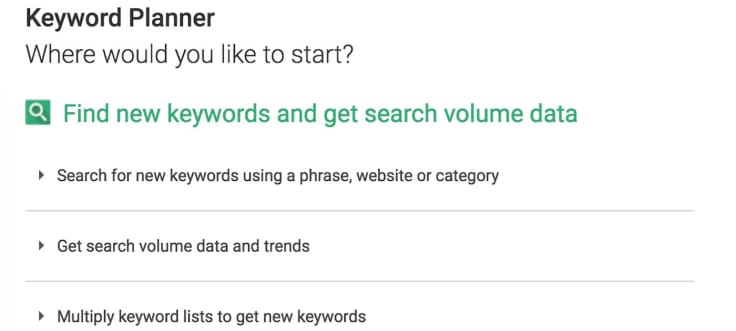
Check “Search for new keywords using a phrase, website or category.” Simply enter a keyword you’d like to check and hit “Get ideas.”
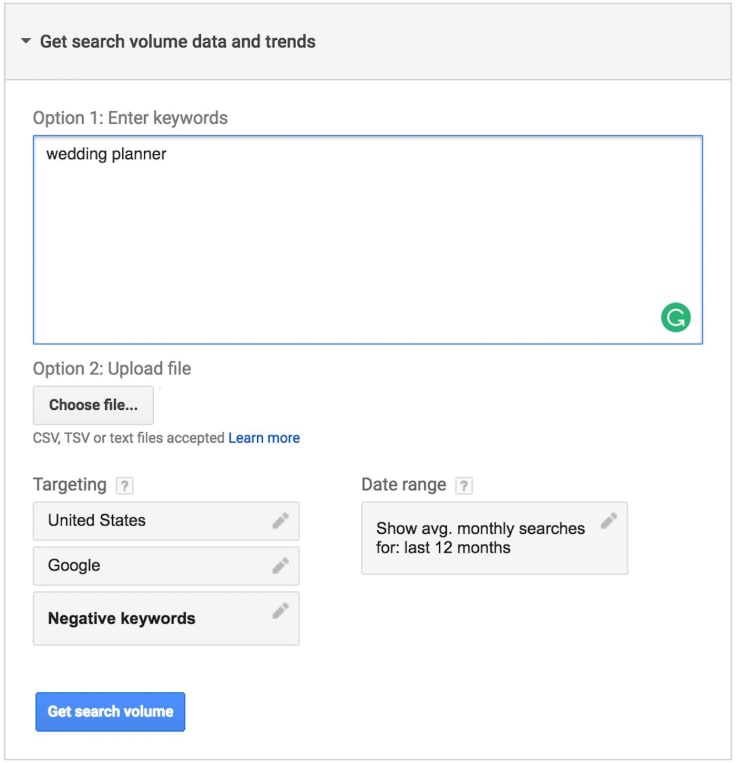
It will give you information about both: search volume and competition, but it will also suggest related keywords that you can find useful.
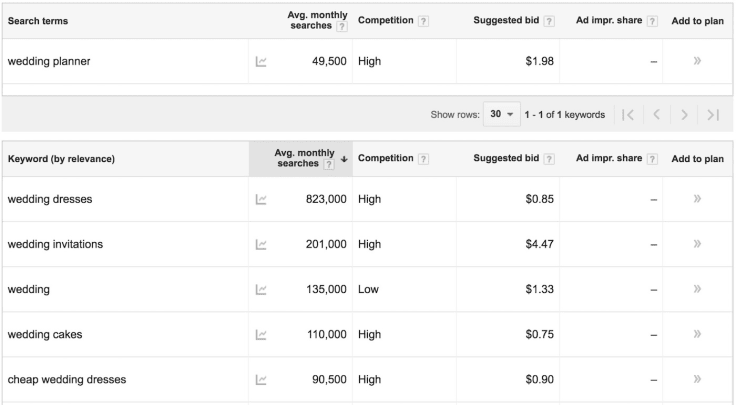
Keyword Planner is a fine tool, however, it’s very basic and won’t allow you to spy on your competition. That’s why you can use other application, Alexa.
Once you’re there, scroll down until you see the search button and enter your competitor’s URL.

It will give you information about the competitor’s main keywords that you probably should include in your content’s body.
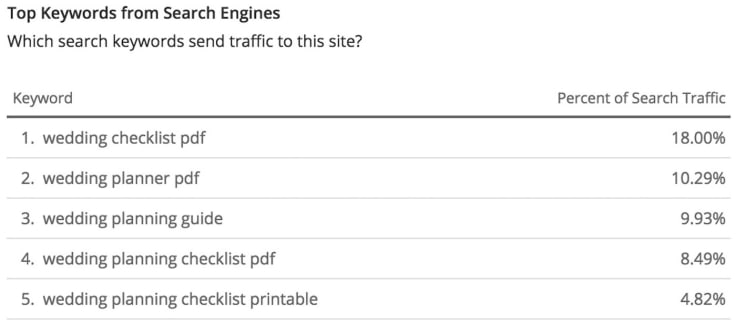
Alexa is not a freemium and at first it will show you only five keywords, however, it offers a 7-day trial and that’s enough to get a full list of all keywords from your industry.
For more advanced SEO actions I highly recommend Semrush as it allows to monitor your keyword rankings in Google, analyze your competitor's websites and look for keyword ideas, but I think that the Keyword Planner and Alexa are great as a starter pack.
SEO content tips
The first rule of SEO writing is that the reader comes first. It means that you don’t want to create texts, posts or an article because you want to rank on Googles first page, the first thing you need to think about is content’s value.
Barbaric methods of gaining easy traffic like writing invisible text or stuffing copy with keywords don't work in 2016. It’s user-unfriendly, SEO hates it and it makes you look like a dumbass.
Once we have it explained, here are SEO best practices:
- Title ("h1") of your page should contain your main keyword,
- URL of your page should contain it as well,
- Be sure to enter your keyword at the beginning of the copy,
- Add main keywords to images’ file names to “Alt Text,”
- Add related keywords in subheadings ("h2" and "h3"),
- Post long, valuable content (at least 800 words long),
- Add valuable links to your content (it’s a good sign for Google if you link to valuable websites),
- Include internal linking (if you link to your own pages, it’s another sign that your content is consistent).
It will be much easier for you to remember about all these things if you have your website built on Wordpress and you’ll install the Yoast plugin. It’s quite basic and far from being perfect, but it’s a nice SEO checklist helping to remember about all important things.
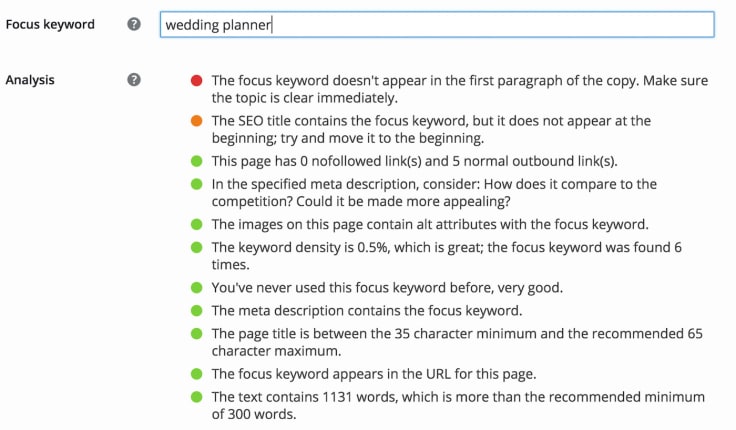
But it’s not only content that makes your page rank high, it’s also a matter of technical aspects. The longer your website visitors stay on your website, the better score you get from uncle Google. If your page doesn’t load or there is a problem with checking it on mobile, your visitors will leave.
That’s why you need to make sure your website loads quickly and you cannot forget about a responsive design.
“The best place to hide a dead body is page 2 of Google search results”
SEO goes for Search Engine Optimization and it helps to drive free, organic traffic and valuable leads to your website and business. So if you don’t want to spend a crazy amount of money on advertising, it’s your best choice!
So remember:
- Gather info about your competitors,
- Pick keywords where you feel you have a chance to provide better content or better value than your competitors and outrank them,
- Build awesome landing pages, optimize for those keywords or topics. The more specific landing page, the better,
- Monitor all your rankings and efforts. Adapt your strategy. If after a month you'll find out that the strategy wasn’t that good, change it as soon as possible.
You need to remember that you have a very small chance of ranking with your service landing pages if you don’t provide value with it. The reason is simple: why would Google or any other search engine rank you for nothing?
You need to provide value to your readers as there is no SEO without content.
But when you provide value better than your competitors and stick to the above pieces of advice, your pages won’t be buried on the second Google search site.
Get a glimpse into the future of business communication with digital natives.
Get the FREE report







Comments